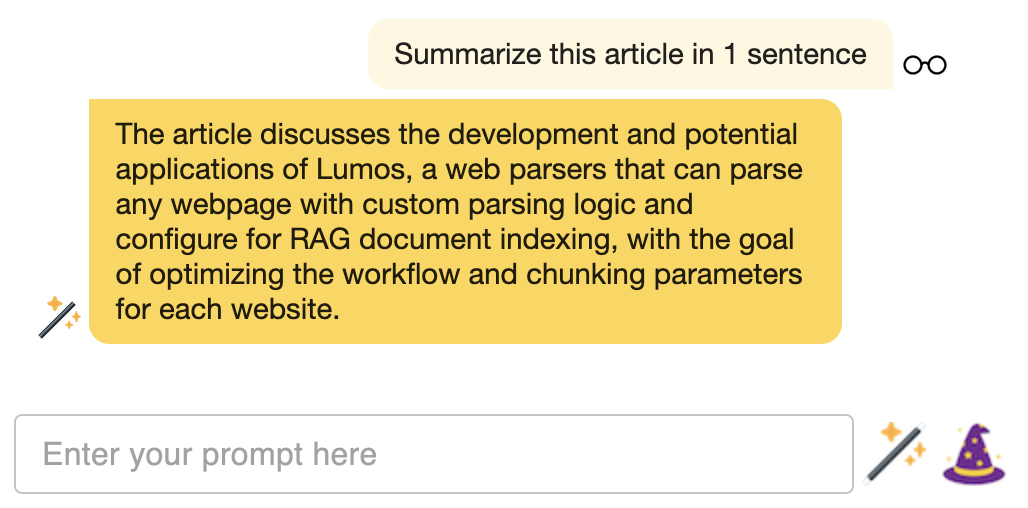A RAG LLM co-pilot for browsing the web, powered by local LLMs.
This Chrome extension is powered by Ollama. Inference is done on your local machine without any external server support. However, due to security constraints in the Chrome extension platform, the app does rely on local server support to run the LLM. This app is inspired by the Chrome extension example provided by the Web LLM project and the local LLM examples provided by LangChain.
Lumos. Nox. Lumos. Nox.
A local Ollama server is needed for the embedding database and LLM inference. Download and install Ollama and the CLI here.
llama2 model is required. The implementation of Lumos is hardcoded to use llama2.
ollama pull llama2
To change models, pull the desired model and update the hardcoded model value.
ollama pull mistral
Update src/scripts/background.ts.
const OLLAMA_MODEL = "mistral"; // change model name hereExample:
OLLAMA_ORIGINS=chrome-extension://* ollama serve
Terminal output:
2023/11/19 20:55:16 images.go:799: total blobs: 6
2023/11/19 20:55:16 images.go:806: total unused blobs removed: 0
2023/11/19 20:55:16 routes.go:777: Listening on 127.0.0.1:11434 (version 0.1.10)
Note: The environment variable OLLAMA_ORIGINS must be set to chrome-extension://* to allow requests originating from the Chrome extension.
The Ollama server can also be run in a Docker container. The container should have the OLLAMA_ORIGINS environment variable set to chrome-extension://*.
Run docker run with the -e flag to set the OLLAMA_ORIGINS environment variable:
docker run -e OLLAMA_ORIGINS="chrome-extension://*" -d -v ollama:/root/.ollama -p 11434:11434 --name ollama ollama/ollama
Update the host and port as needed (src/scripts/background.ts):
const OLLAMA_BASE_URL = "http://0.0.0.0:11434";In the project directory, you can run:
Launches the test runner in the interactive watch mode.
See the section about running tests for more information.
Builds the app for production to the dist folder.
It correctly bundles React in production mode and optimizes the build for the best performance.
The build is minified and the filenames include the hashes.
Your app is ready to be deployed!
See the section about deployment for more information.
https://developer.chrome.com/docs/extensions/mv3/getstarted/development-basics/#load-unpacked
Lumos's default content parser will extract all text content between a page's <body></body> tag. To customize the content parser, add an entry to the file contentConfig.ts.
Example:
export const contentConfig: ContentConfig = {
// each domain can have its own content parser
"domain.com": {
// number of characters to chunk page content into for indexing into RAG vectorstore
chunkSize: 500,
// number of characters to overlap in chunks for indexing into RAG vectorstore
chunkOverlap: 100,
// document.querySelector() queries to perform to retrieve page content
selectors: [
"body",
],
// document.querySelectorAll() queries to perform to retrieve page content
selectorsAll: [
"comment",
],
},
}See documentation for querySelector() and querySelectorAll() to confirm all querying capabilities.
- Summarize long threads on issue tracking sites, forums, and social media sites.
- Summarize news articles.
- Ask questions about reviews on business and product pages.
- Ask questions about long, technical documentation.
- ... what else?
